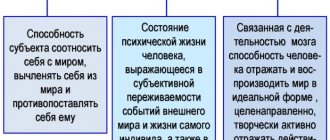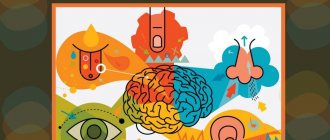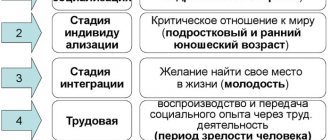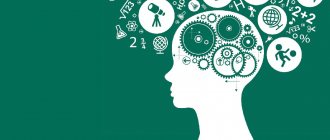A person doesn’t even think about why mental images appear in him, he manages to realize the situations that have happened, think about them and draw conclusions. We don't just store facts and a knowledge base, we are able to reflect, use our mental faculties, analyze, appreciate, create and love. We are drawn to the beautiful, the unknown and the perfect. The source of these abilities is our consciousness. No matter how trivial it may be, it is what distinguishes us from animals and other life forms. But what is consciousness? What are its features? How is the formation and development of consciousness carried out?
What is consciousness?
The study of consciousness is carried out by philosophy, psychology and other sciences, the subject of which is artificial intelligence. In a broad sense, consciousness is perceived as a form of any psychological reflection. In a narrow sense, consciousness is defined as the perception of what enters the human brain. From this concept it follows that consciousness is characteristic only of people.
Although scientists are making every effort to study this psychological feature of a person, it is impossible to fully understand its form and source of development. Therefore, computers and robots fail to achieve conscious action. Researchers can recognize how the latest computer works, but there are a number of differences between it and the workings of the human brain.
In practice, consciousness is a collection of sensory and mental images, which are the subject of deep reflection. Scientists believe that similar psychological processes occur in the brains of some developed animals: horses, dolphins, dogs, monkeys and others. However, the presence of this psychological process does not yet indicate awareness and the ability to perceive. The mechanism of the process and the result of information processing is the main property inherent only to humans. Considering the individuality and complexity of the formation of consciousness, it is beginning to be considered a phenomenon that holds many secrets and features incomprehensible to humans.
Main characteristics of consciousness
Actively. This characteristic applies to many animals, but a distinctive feature of man is the ability to psychologically reflect reality, to perceive the world around him not passively and indifferently, but according to the degree of significance. Such differentiation occurs consciously, but without human intervention in the psychological processes of the brain.
Intentionally. This property means “aspiration”, “direction”. The characteristic of consciousness is expressed in a person’s desire to realize a goal that appears as a result of conscious thinking or unconscious intention. In the literal sense, “intention” implies a person’s attraction to the implementation of a given task without direct intervention.
The presence of the main characteristics of consciousness produces the following properties:
Psychological reflection through the use of human feelings and cognitive processes (memory, thinking, sensation, imagination, perception). When one of the processes is disrupted, conscious actions are also disrupted. Self-esteem and reflection. A person is able to observe himself, control emotions, thoughts and actions. Thanks to this, human ideals and values are born. Hegel's statement reflects this characteristic well. He said that although man is an animal, he is aware of it, which means he is no longer an animal. Ability to make sound judgments. This property is clearly manifested in moral feelings and judgments, moral qualities and life values. Setting a goal. A person is able, on the basis of conscious activity, to make decisions, make plans, motivate himself, and make some adjustments.
It is noteworthy that all information received by the brain is processed and realized by a person. At first, a person takes active steps to assess the situation that has occurred, and then the processes are automated.
Conscious and unconscious actions
Consciousness does not exclude unconscious activity. If at first we analyze our actions, evaluate them, reflect on the situation or a question that is new to us. All this is recognized without human intervention in psychological activity. However, the process of fulfilling and achieving the set goal is automated.
Unconscious actions include walking, singing, speaking, reading, counting, and writing. To achieve automation, a person actively manages these processes and works hard on them. Moreover, such unconscious repetition of habitual actions can in an instant go from automated to controlled and controlled. In an unconscious state, a person is not able to objectively assess the situation, he does not control it and does not own this problem, he needs help, his behavior is disrupted and there is no ability to keep track of time.
A clear manifestation of unconscious activity is sleep. During this complex process, countless reactions occur in the brain. GNI is inhibited, and thanks to dreams, psychological exhaustion is prevented.
Dreams are one of the forms of consciousness, which is characterized by the presence of ideas. One of the scientists emphasized that dreams are an amazing combination of past experiences. What we see in a dream has already happened in life. Some absurd pictures that may appear before our eyes are based on experiences that have already occurred, which enter into reactions and various connections in a certain part of the brain.
When we wake up, we move from an unconscious state to a conscious state. Therefore, life is a unity and harmonious combination of subconscious life and conscious life.
Consciousness is especially necessary in such situations:
In solving complex and conflict situations. Make a decision if necessary. At the moment of psychological or mental threat. As necessary to overcome psychological or mental resistance.
Marketers especially often take advantage of a person's ability to act unconsciously. These people purposefully use a person’s tendency not to catch some information, but immediately put it into the subconscious. As a result, when a person sees similar information again, it seems familiar to him and, accordingly, necessary. So, without realizing it at all, we purchase goods that we do not need at all.
Scientists have realized that it is possible to easily control a person’s psyche by providing him with information at a certain moment. So this knowledge bypasses consciousness and is immediately deposited in the subconscious. This theory is called the 25th frame.
The ability of the brain to quickly perceive new information without the participation of consciousness and remember it well is used not only for the selfish purposes of marketers. There are a number of methods for learning a foreign language. One of the most effective is to use the 25th frame. The training lasts 45 minutes, which are divided into three parts. During the first, you are offered to view pictures with written foreign words, which change 25 frames per second.
Then, for the next 15 minutes, review the same words, but listen to the pronunciation. This lesson proceeds at a normal pace. The last 15 minutes are practice and you need to make an effort to get the right words out of your subconscious. Thanks to this technique, a person is able to memorize 7,000 new foreign words in just an hour, and these words remain in memory, although you may not use the language you are learning. Compared to the traditional way of teaching and learning a foreign language, you will have to put in a year and a half of effort.
Philosophy: lecture notes
Lecture No. 11. Consciousness
Consciousness
as a philosophical term - the highest, uniquely human form of reflection of objective reality.
Consciousness
is a set of mental processes that are actively involved in a person’s understanding of the objective world and his own existence. It arises in the process of labor, social and production activity of people and is inextricably linked with language, as ancient as consciousness.
From birth, a person enters the world of objects created by the hands of his ancestors, and is formed as such only in the process of learning how to use them. A person’s way of relating to reality is determined not by his bodily organization (as in animals), but by the skills of objective actions acquired through communication with other people. By mastering historically developed methods of objective activity, especially language, a person receives objective knowledge about the properties of objects in the world. A person stands out and opposes himself to objective reality thanks to purposeful actions, that is, his active life is guided by ideas or knowledge about the real properties of objects. It is precisely because a person treats objects with understanding, with knowledge, that his way of relating to the world is called consciousness.
Without understanding and knowledge, which socio-historical objective activity and human speech bring with them, there is no consciousness. Any sensory image of an object, any sensation or idea is part of consciousness insofar as it has a certain meaning in the system of knowledge acquired through social activity. Knowledge stored in language directs and differentiates a person’s feelings, will, attention and other mental acts, uniting them into a single consciousness. The knowledge accumulated by history, political and legal ideas, artistic achievements, morality, religion and social psychology represent the consciousness of society as a whole. However, consciousness cannot be identified only with logical thinking. Outside of sensory-volitional, active activity, the entire sphere of mental thinking does not exist at all. If a person only carried out logical operations one after another, but in practice did not sense, feel, or experience the constant correlation of the meaning of his concepts with active actions and perceptions of reality, then he would not understand and be aware of neither reality nor himself, that is, it would have neither consciousness nor self-awareness. However, the concepts of “psyche” and “consciousness” cannot be identified, i.e., one cannot assume that all mental processes in a person are included in consciousness at any given moment. A number of mental experiences may remain for a certain time, as it were, beyond the threshold of consciousness. Consciousness, absorbing historical experience, knowledge and methods of thinking developed by previous history, masters reality ideally, setting new goals and objectives, creating a project for future tools, directing all practical human activities.
Consciousness and self-awareness
Consciousness plays a key role in the process of assessing oneself as an individual. A person is capable of evaluating, cognizing, and exploring himself, both as an individual and as a subject of collective activity. Self-awareness implies a continuous process of self-improvement and improvement of one's achievements and qualities.
There is even a branch of psychology that studies the “I.” There is an opinion that the “I,” that is, a person’s consciousness, is several images: from ordinary to ideal and even fantastic. Depending on the perception of oneself, a person makes decisions and subsequently acts.
Self-awareness also manifests itself in personal self-esteem. It is closely related to a person’s aspirations and desired level of achievement. The scale of aspirations increases if the individual manages to achieve the set bar and decreases if the person is haunted by failures.
The concept of consciousness in psychology
From the point of view of psychology, consciousness is the ability to reflect on oneself , one’s actions and the surrounding world, which is the highest mental function.
That is, I know that I am me, and you are you. I see the cause-and-effect relationships of events and phenomena, and if I don’t see them, then I can imagine them abstractly and fantasize.
I can feel my body, be aware of the feelings and emotions that belong to me. I even know how to broadcast all this through speech, facial expressions and gestures (verbal and non-verbal).
How to master the conscious and subconscious
Due to the flow of information that hits a person, it is recommended to be extremely careful. Since the subconscious is intertwined with self-consciousness, it is necessary to begin to improve in various areas, but especially in art. This way you will be able to use your mind to a greater extent.
Be positive and visualize success. In this case, you will definitely be able to achieve your goal. Watch what you read or watch before bed. If you want to remember information that is useful for yourself or learn new foreign words, then repeat them before going to bed. For an hour at night, the brain will process the acquired knowledge and put it into the subconscious.
The more a person delves into the work of the brain and consciousness, the more difficult it is for him and the further he goes from the truth. Only a person is capable of knowing himself and exploring his own brain with the help of his brain. This dignity must be appreciated, used as much as possible with mental abilities, developed and controlled by the flow of information introduced into us.
The purpose of self-awareness of a person’s personality
It is not easy to control the mind. This is why many spiritual teachings recommend meditation practices to calm the voices in the head and bring the psyche into a state of complete concentration. In Indian philosophy this state is called samadhi, “concentrated mind.”
It is said that when the mind is concentrated, then a person can realize his true Self. The nature of this “I,” according to ancient Vedic teachings, is sat-chit-ananda.
Sat – “truth, immutability, eternity, being.” This is something that does not depend on our experience, something that has always been and will be.
Chit – “knowledge”. This is the very ability of consciousness. It is the development that makes experience possible.
Ananda - "bliss". A world that surpasses all understanding and lies beyond all thought. It is the state of grace from relationships with other living beings that we strive to return to.








